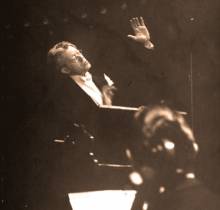
Artur Rodziński (January 1, 1892 - November 27, 1958) was a Polish conductor of opera and symphonic music. Artur Rodziński was born in Split, the capital of Dalmatia on January 1, 1892. Soon after, his father, of Polish descent, and a general in the army of the Habsburg empire returned with his family to Lwów, Poland. Artur studied music in Lwów, and then law in Vienna, where he simultaneously enrolled at the Academy of Music; his teachers there included Josef Marx and Franz Schreker (composition), Franz Schalk (conducting), and Emil von Sauer and Jerzy Lalewicz (piano). He returned to Lwów where he was engaged as chorus master at the Opera House, making his debut as a conductor in 1920 with Verdi's Ernani. The following year saw him conducting the Warsaw Philharmonic Orchestra and at the Warsaw Opera House. While visiting Poland, Leopold Stokowski heard Rodziński leading a performance of Wagner's Die Meistersinger von Nürnberg and exclaimed "I have found that rare thing, a born conductor!" and invited him to conduct the Philadelphia Orchestra. Between 1925 and 1929 he served as Stokowski's assistant, conducted for the Philadelphia Grand Opera and directed the opera and orchestral departments at the Curtis Institute of Music. From 1929 to 1933, Rodziński became the music director of the Los Angeles Philharmonic, garnering praise not only for his interpretations but for his innovative programming. From 1933 to 1943, he was music director of the Cleveland Orchestra, developing it into one of the foremost orchestras in America. He engaged new musicians and raised the playing standards to a very high level. His programs were innovative, offering works such as the first performance in America of Shostakovich's opera Lady Macbeth of Mtsensk, which gained the orchestra national attention. Between December 1939 and February 1942, Rodziński and the Cleveland Orchestra made an extensive series of recordings for the Columbia Records label. During this time he appeared with the New York Philharmonic Orchestra in 1934 and 1937, when his concert performance of Richard Strauss's Elektra (which was recorded) aroused great enthusiasm. Rodziński was also active in Europe, becoming the first naturalized American citizen to conduct the Vienna Philharmonic Orchestra at the Salzburg Festival in 1936 and 1937. At Arturo Toscanini's recommendation, Rodziński was engaged by NBC to select the musicians for the new NBC Symphony Orchestra. He rigorously trained the orchestra and conducted its first concerts in 1937, before the arrival of Toscanini. Rodziński was appointed music director of the New York Philharmonic Symphony Orchestra in 1943. Though his four year tenure was marked by struggles with Arthur Judson, the powerful manager of the orchestra, Rodziński achieved high standards of performance. The renowned music critic and composer Virgil Thomson wrote about Rodziński's tenure at the Philharmonic: "We now have an orchestra that is a joy to hear...and we owe it all to Artur Rodziński." During Rodziński's time on the podium the Philharmonic recorded extensively, again for Columbia, performed weekly live broadcasts on CBS Radio, and appeared in the feature film Carnegie Hall. However, despite the quality of the orchestra's performances, numerous artistic matters such as the prerogative of the music director to dismiss musicians, select soloists and determine repertoire were persistent grounds of contention. Not willing to compromise on these matters, Rodziński resigned in 1947. His reputation as a conductor was so prominent at this time that his resignation was the subject of a cover story in Time magazine in February 1947. The Chicago Symphony Orchestra had been wooing Rodziński for some time and now he decided to immediately accept the leadership of that orchestra starting with the 1947-1948 season. Here again, an inability to work with the board resulted in his swift departure after only one season. His short tenure still had a significant impact upon the orchestra and local audiences through performances such as a legendary account of Wagner's Tristan und Isolde with Kirsten Flagstad. After his departure from Chicago, Rodziński's health began to deteriorate. There was little recording activity available to him in the U.S. and he settled in Europe once more. Here his status as a major musician was recognized and he was invited to lead significant productions, such as the 1953 first performance of Prokofiev's War and Peace at the Maggio Musicale in Florence, as well as traditional repertoire works. He conducted at La Scala and also worked extensively for Italian radio, conducting well received readings of Wagner's Tannhäuser and Tristan, and Mussorgsky's Boris Godunov and Khovanshchina. He re-established his presence as a recording artist through a contract with Westminster Records, for whom he recorded extensively with Thomas Beecham's Royal Philharmonic Orchestra in London from 1955. His final recordings were for EMI in 1958. By this time Rodziński's health was fragile. He was warned by his Italian doctor that further conducting activity would put his life at risk. However, he returned to Chicago in 1958 to conduct Tristan once again, this time with the Chicago Lyric Opera and soprano Birgit Nilsson. His return was a triumph, but these were his last performances and he died shortly afterwards.
Peter Ilyich Tchaikovsky Symphony no 4 in F minor, Op. 36 NBC Symphony Orchestra 02.01.1939 Symphony no 6 in B minor, Op. 74 "Pathétique" New York Philharmonic Symphony Orchestra 11.12.1944 Artur Rodzinski | 
